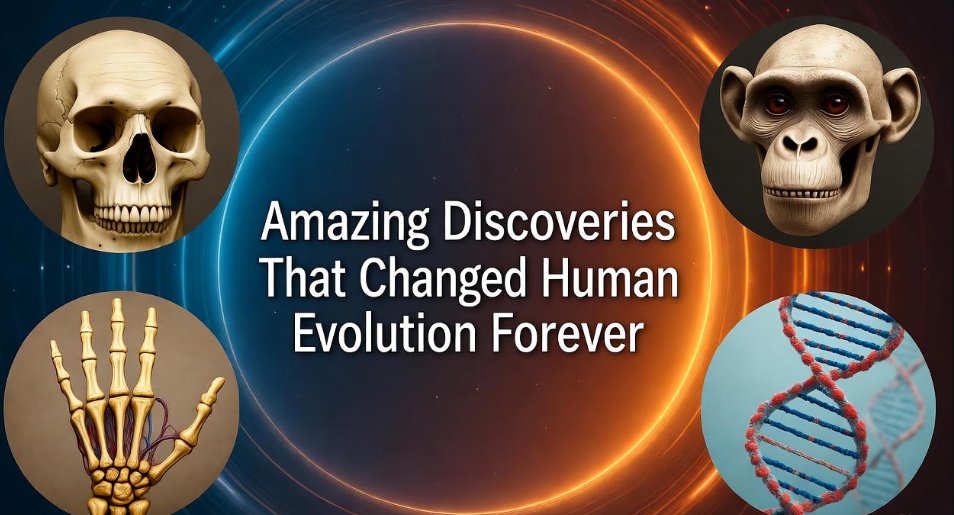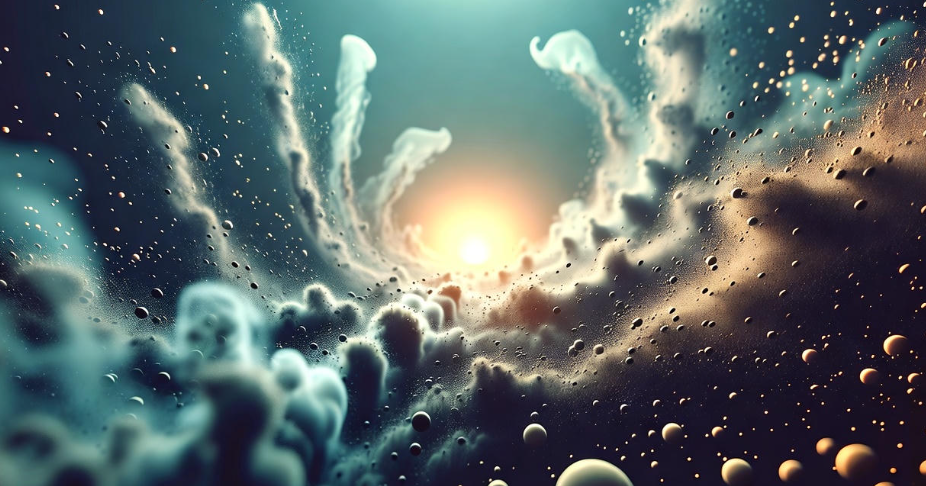When we look at ourselves today — using smartphones, building rockets, and exploring other planets — it’s easy to forget how far humanity has come. Our journey through evolution wasn’t just shaped by time; it was transformed by discoveries that changed who we are, how we think, and how we survive. From fire to DNA, from tools to artificial intelligence, these discoveries didn’t just push us forward — they defined us. 🔥🧠
Let’s take a journey through time and uncover the amazing discoveries that changed human evolution forever.
The Discovery of Fire 🔥
Fire wasn’t just warmth — it was power. Early humans discovered fire nearly a million years ago, and that single discovery changed everything. With fire, they could cook food, making it easier to chew and digest. This allowed our ancestors to gain more energy and nutrients, helping our brains grow larger over time.
Fire also gave protection from wild animals and allowed people to gather at night, sparking something new — communication, storytelling, and community. Some scientists even say fire was the beginning of “culture.” Imagine that — a spark that lit not just wood but the human mind itself.
| Benefit of Fire | Impact on Evolution |
|---|---|
| Cooking Food | Improved digestion & brain growth |
| Light & Heat | Night activities, longer days |
| Protection | Safer living environments |
| Social Interaction | Birth of communication & bonding |
The Invention of Tools 🪓
Before technology, there were stones. The first simple tools made from rocks changed how humans interacted with the world. They could cut meat, break bones, and build shelters. Over time, tools evolved — from stone axes to metal weapons — showing that humans weren’t just surviving; they were learning.
The use of tools proved something powerful: humans could shape their environment. That realization marked the true beginning of our dominance over nature. Every invention since — from a hammer to a laptop — is part of that same instinct to create and control.
The Mastery of Language 🗣️
What truly set humans apart from other species? It wasn’t just opposable thumbs — it was the ability to talk, to think in words. Language allowed humans to pass on knowledge, plan hunts, teach, and build relationships.
It’s believed that the development of complex speech around 100,000 years ago created the foundation for culture, religion, and science. Through language, humans could dream, imagine, and organize — and that’s how civilizations began.
| Before Language | After Language |
|---|---|
| Limited communication | Shared ideas & planning |
| Instinct-based living | Culture & cooperation |
| Survival focus | Innovation & growth |
The Agricultural Revolution 🌾
About 10,000 years ago, humans stopped wandering and started farming. This moment — the Agricultural Revolution — completely reshaped society. People began to grow crops, domesticate animals, and settle down.
Farming created stable food supplies, which meant larger families, villages, and eventually, cities. It also gave birth to trade, ownership, and wealth. The shift from hunting to farming changed not only our diet but our entire way of thinking. Humans started to see the world as something they could manage.
Fun fact: The earliest evidence of agriculture comes from the Fertile Crescent, a region in modern-day Iraq and Turkey — often called the “Cradle of Civilization.”
The Discovery of the Wheel 🛞
The wheel might seem simple now, but when it first appeared around 3500 BCE, it was revolutionary. It transformed transport, trade, and even pottery.
Wheels made it possible to move goods and people across great distances. Civilizations could now connect, share ideas, and expand faster. Without the wheel, there would be no cars, trains, or airplanes today.
Sometimes, the simplest ideas make the biggest difference.
The Understanding of the Human Mind 🧠
When humans began to study themselves — their thoughts, dreams, and emotions — something incredible happened. Ancient philosophers and later scientists started to understand how the mind works.
This journey eventually led to psychology, neuroscience, and medicine. It helped humans understand depression, learning, memory, and creativity. Knowing why we think or feel certain ways allowed us to grow emotionally and intellectually.
The Discovery of DNA 🧬
In 1953, James Watson and Francis Crick announced the discovery of the DNA double helix. That single discovery opened the door to understanding what makes us human — our genes, our evolution, and even our diseases.
DNA showed how we are connected to every other living thing on Earth. It also revealed how evolution works — through small, powerful genetic changes over millions of years.
| Discovery | Impact |
|---|---|
| DNA Structure | Explained heredity |
| Genetic Engineering | Cured diseases, created biotech |
| Evolutionary Biology | Connected humans to all life |
The discovery of DNA didn’t just explain our past — it’s shaping our future, from cloning to gene therapy.
The Scientific Revolution 🔬
When people like Galileo, Newton, and Copernicus questioned old beliefs, they didn’t just discover new facts — they changed how we think.
The Scientific Revolution in the 16th and 17th centuries introduced observation, experimentation, and logic. Instead of believing in magic or superstition, humans began to rely on evidence. This mindset led to inventions, industrialization, and the modern world.
It was the moment when curiosity became humanity’s greatest strength.
The Industrial Revolution ⚙️
The 18th century brought machines, factories, and cities. Humans moved from fields to factories, producing goods faster than ever. This revolution transformed economies, education, and lifestyles.
But it also created challenges — pollution, inequality, and social change. Still, it pushed humans toward urban life, technology, and the concept of progress.
The Industrial Revolution wasn’t just about machines; it was about mindset — the idea that humans could build their own future.
The Discovery of Electricity ⚡
Imagine a world without light bulbs, computers, or phones. Electricity made everything possible. Scientists like Benjamin Franklin, Nikola Tesla, and Thomas Edison turned invisible forces into the foundation of modern life.
Electricity powered industries, communication, and cities. It’s hard to imagine evolution without it — not biological, but technological evolution. It changed how we live, work, and connect.
The Age of the Internet 🌐
And then came the internet — the discovery that connected the entire world. From the 1990s onward, information became global, instant, and limitless.
Humans evolved again, not biologically this time, but digitally. We communicate, learn, shop, and even fall in love online. The internet became the modern version of fire — a tool that unites and transforms societies.
| Era | Key Discovery | Human Impact |
|---|---|---|
| Stone Age | Fire | Survival & communication |
| Bronze Age | Tools & wheels | Expansion & trade |
| Iron Age | Agriculture | Civilization |
| Modern Age | Electricity | Technology growth |
| Digital Age | Internet | Global connection |
The Rise of Artificial Intelligence 🤖
We are now living through another turning point. Artificial Intelligence is reshaping evolution once again — but this time, we’re not adapting to nature; we’re adapting to machines.
AI can think, learn, and even create art or music. It’s changing how humans work, heal, and explore. Some say it’s the next step of human evolution — merging biology with technology.
Will AI make us obsolete or more powerful? That’s a question the future will answer.
The Future of Human Evolution 🚀
From walking upright to walking on the Moon, human evolution has never stopped. We’ve gone from surviving to thriving — from making fire to making robots.
The next steps could include genetic engineering, space colonization, and even digital immortality. Every discovery is a reminder that evolution isn’t just about physical change — it’s about awareness, adaptation, and imagination.
Human evolution is no longer controlled by nature alone. It’s in our hands now. And that’s both amazing and a little terrifying. 🌍✨


Frequently Asked Questions (FAQs)
1. What is the most important discovery in human evolution?
While many discoveries shaped us, the discovery of fire is often seen as the most important. It allowed humans to cook, stay warm, and build social structures that led to modern civilization.
2. How did tools change early human life?
Tools gave early humans control over their environment. They could hunt more effectively, build shelters, and survive harsh conditions — all key to human progress.
3. Did language really affect human evolution?
Yes, deeply. Language allowed knowledge to be shared, emotions to be expressed, and complex societies to be formed. It’s what made culture and science possible.
4. What discovery had the biggest impact on modern humans?
The internet and electricity revolutionized modern life. They changed communication, education, business, and even relationships.
5. What could be the next big step in human evolution?
Genetic modification, artificial intelligence integration, and space colonization could define the next era of evolution — where humans become both biological and technological beings.
Final Thoughts 🌟
Humanity’s story isn’t just written in history books — it’s written in every discovery we make. From sparks of fire to sparks of intelligence, our journey is about curiosity, courage, and change.
Each discovery, no matter how small, carried humanity a little further from caves and a little closer to the stars. And who knows? The next big leap might already be happening — maybe even inside your mind right now. 💫

Leave a Reply